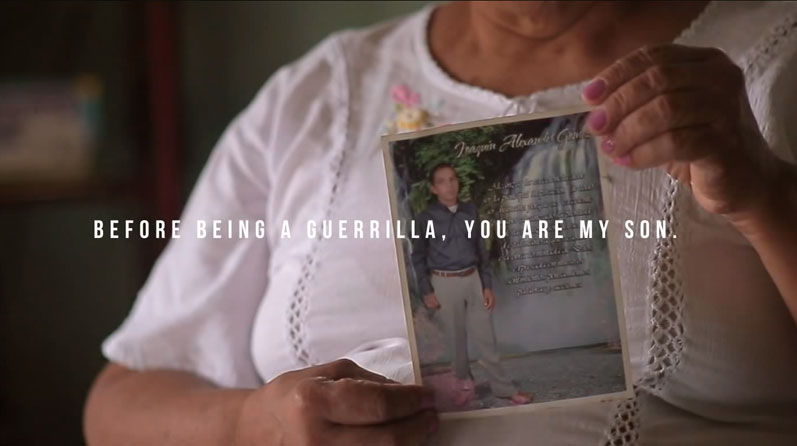
25 Dec What Star Wars & Christmas can tell us about the fight against ISIS.
1) HOW A STORY IS TOLD
Sometime between the UK’s vote on military action in Syria, and the premiere of ‘A Force Awakens’, a picture of Luke Skywalker appeared on Facebook, with the following summary:
“Star Wars: the story of an orphaned boy, who becomes radicalized after a military strike kills his family. He is indoctrinated into an ancient religion, joins a band of rebel insurgents, and carries out a terrorist attack killing 300,000 people.”
This is of course a sly allusion, comparing the beloved Jedi from Tatooine, with modern Jihadists from Iraq and Syria.
If you’ve seen Star Wars, you’ll know the summary’s pretty accurate, except maybe for the word ‘terrorist’. After all, Luke’s a good guy, right? And good guys only kill bad guys.
“Luke’s a good guy, right? And good guys only kill bad guys.”
Although there isn’t an internationally agreed definition of ‘terrorism’, the UK’s Terrorism Act 2000 defines it as:
“The use or threat of action, designed to influence the government, or to intimidate the public, for the purposes of advancing a political, religious, racial or ideological cause.”
So it doesn’t matter who you are, or who you’re fighting: if you’re using force to get your way, you’re a terrorist.
The problem is: nobody who ‘uses action to advance their cause’ calls themselves a terrorist. That’s always what the other side says about them.
In Star Wars, as in the American War of Independence against Great Britain, The Empire is presented as evil ‘colonialists’, whilst the Rebels are ‘freedom fighters’ – even though at the time, the question of who was in the right and in the wrong was hotly contested.
Our understanding of a situation then, and how we respond to it, comes down to how a story is told, and whose narrative we follow.
What then, is the narrative of a modern ‘terrorist’?


2) THE REINSERTION OF THE HUMAN ASPECT
In time for Christmas, the radio show This American Life aired a podcast featuring a story about Colombian terrorism.
For over fifty years, FARC rebels have been hiding in the jungle, fighting for more egalitarian land reform against what they consider to be a succession of brutally repressive governments.
They fund their actions through kidnapping, extortion and illegal drug distribution, and the resulting conflict has cost over 220,000 lives.
So the Colombian government commissioned an advertising executive named Jose Miguel Sokoloff to convince as many FARC guerrillas as possible to quit.
The first thing Jose’s company did was conduct some market research. They interviewed former FARC soldiers who had demobilized, to find out what makes someone leave.
In 2010, they noticed that demobilization numbers always peaked around Christmas. The guerrillas missed home.
“There’s no friends,” Jose said, “there’s no party. There’s no aguardiente, which is a drink that we have here. There is nothing. There’s no fun. You’re just walking by and hoping that the [national] army doesn’t see you and shoot you.”
What Jose decided to offer the guerrillas, was a new narrative – called ‘Operation Christmas’.
“What Jose offered the guerrillas was a new narrative – called ‘Operation Christmas’.”
“Christmas lights. I’m talking about gigantic trees that we put in nine strategic pathways in the jungles, covered with Christmas lights.”
These trees – airlifted in by Black Hawk helicopters – lit up at night, and beside each one was a sign linked to a motion sensor. When someone approached, the sign said:
“If Christmas can come to the jungle, you can come home. Demobilize. It’s Christmas. Everything is possible.”
After that particular campaign, 30% more soldiers quit than the previous year.
Then in 2012, Jose’s team found 37 mothers of guerrilla fighters who were willing to give them pictures of the fighters as children. They printed up thousands of posters of the pictures, and attached them to trees in FARC areas, along with the message:
“Before you were a guerrilla, you were my child. Come back this Christmas. I’m waiting for you.”
It worked. It gave many guerrillas the nudge they needed to quit. Why?
“War is a human endeavour,” Jose says, “it’s fought by human beings. And when humanity is removed from the equation, by one side or the other, I think the reinsertion of the human aspect gives you an edge.”
So how does all this apply to the fight against ISIS?


3) BEYOND US & THEM.
As ethnographers, we’re interested in how people live, and why they’re living the way they do.
So when we think about ‘the fight against ISIS’, and how to change the behaviour of a would-be terrorist, two questions come to mind:
a) Why do people join ISIS?
ISIS members aren’t born into it like a religion or nation. It’s a choice influenced by various factors.
According to several researchers (such as anthropologist Professor Scott Atran at Oxford University, filmmaker Deeyah Khan who spent 18 months interviewing ex-extremists, and psychologist John Horgan at Massachusetts Lowell’s Centre for Terrorism and Security Studies):
Foreign fighters join because they feel disenfranchised, lonely and insecure. For them, ISIS offers meaning and hero status, with a sense of empowerment and camaraderie.
Regional fighters join because they’ve seen their homes, livelihoods and families destroyed by war (mainly the fallout of the US-led Iraq war). ISIS offers them a narrative to believe in, revenge, and financial security with the ‘winning’ side.
“ISIS offers them a narrative to believe in, revenge, and financial security with the ‘winning’ side.”
To counter these things, we have to offer a more attractive and convincing alternative:
A secure future with loved ones, and an infrastructure that provides genuinely equal opportunities for wealth and mental and physical health.
b) Why do they attack us?
They attack us because it serves a seductive and reductive, age-old narrative of good versus evil, rebels versus empire, us versus them.
People are tribal animals at heart. For ISIS, the opposing tribes are: Fundamental Islam versus The West.
Even though most Muslims do not attack Westerners, and most Westerners do not colonize the Middle East – various media, people and political leaders have been helping reinforce this narrative in many different ways.
One of the most recurrent threads to a Jihadist’s narrative is the accusation of ‘Western and Zionist occupation of Muslim lands’.
“A recurrent thread to Jihadist narrative is the accusation of ‘occupation of Muslim lands’.”
Not all ISIS fighters actually care about or understand this claim (the world is, after all, much more complex), and many are only fighting for the money, the glory, or to bring about ‘The End Of Days’, but it’s still a grievance widely parroted in a bid to gain sympathy.
So to counter these things:
Firstly, our governments need to honestly and openly address our activities in the Middle East – including the consequences of our military campaigns and arms deals, and Israel’s continuing settlements in the West Bank – and ask whether we’re guilty of double standards that may exacerbate the situation.
And secondly, we have to offer a much stronger, more credible narrative, beyond ‘us and them’, built on a common humanity and a shared future.
What does that actually mean in real life?
It might mean using our imagination to produce something as deceptively simple as beautiful lights on trees, or pictures that tell powerful stories.

*******************
REFERENCES:
Definition of Terrorism:
https://www.mi5.gov.uk/home/the-threats/terrorism.html
Demobilizing Colombian Guerrillas:
http://www.thisamericanlife.org/radio-archives/episode/575/poetry-of-propaganda
Why People Join ISIS:
http://www.ibtimes.com/why-do-people-join-isis-psychology-terrorist-1680444
http://www.theguardian.com/commentisfree/2015/nov/15/terrorists-isis
What ISIS Want:
http://www.theatlantic.com/magazine/archive/2015/03/what-isis-really-wants/384980/
Impact Of Military Actions:
http://foreignpolicy.com/2013/04/23/the-psychological-impact-of-the-iraq-war/
http://www.vice.com/en_uk/read/asking-syrians-about-bombing-syria-800
Trail Of Weapons:
http://uk.businessinsider.com/arms-sales-by-the-us-and-russia-2014-8?r=US&IR=T
http://www.huffingtonpost.com/2014/10/06/isis-weapons-report_n_5942334.html
http://www.theguardian.com/world/2015/apr/23/the-18bn-arms-race-middle-east-russia-iran-iraq-un
Israel & Settlements:
http://www.jpost.com/Arab-Israeli-Conflict/ISIS-in-Sinai-threatens-to-attack-Israel-432684
http://origin-www.bloombergview.com/quicktake/israeli-settlements
http://thinkprogress.org/world/2015/11/10/3720765/religious-right-israeli-settlements/
*******************


